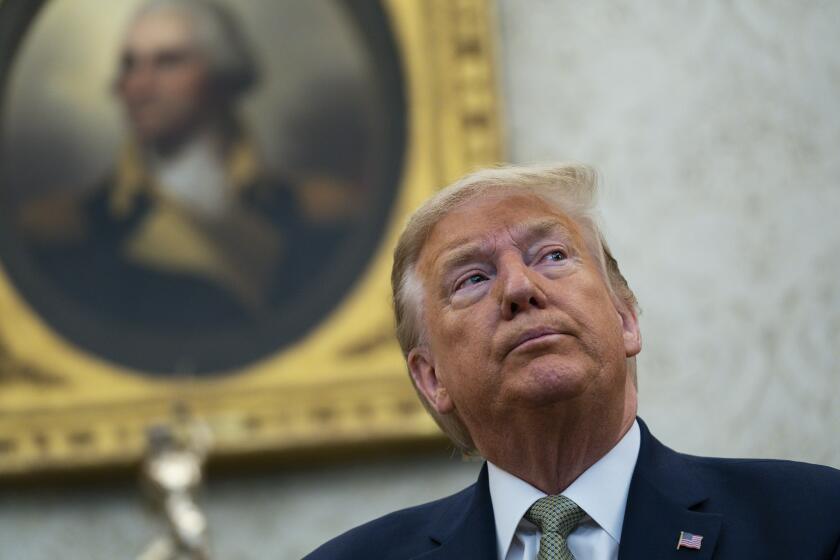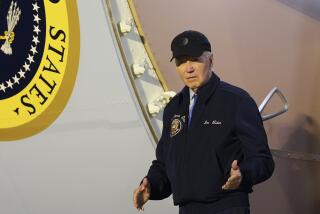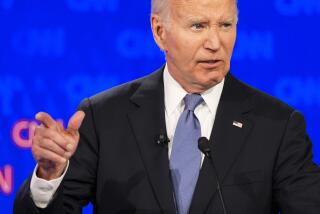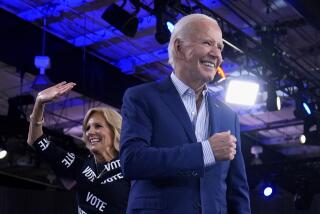Biden launches opening salvo of general election and attacks Trump on coronavirus
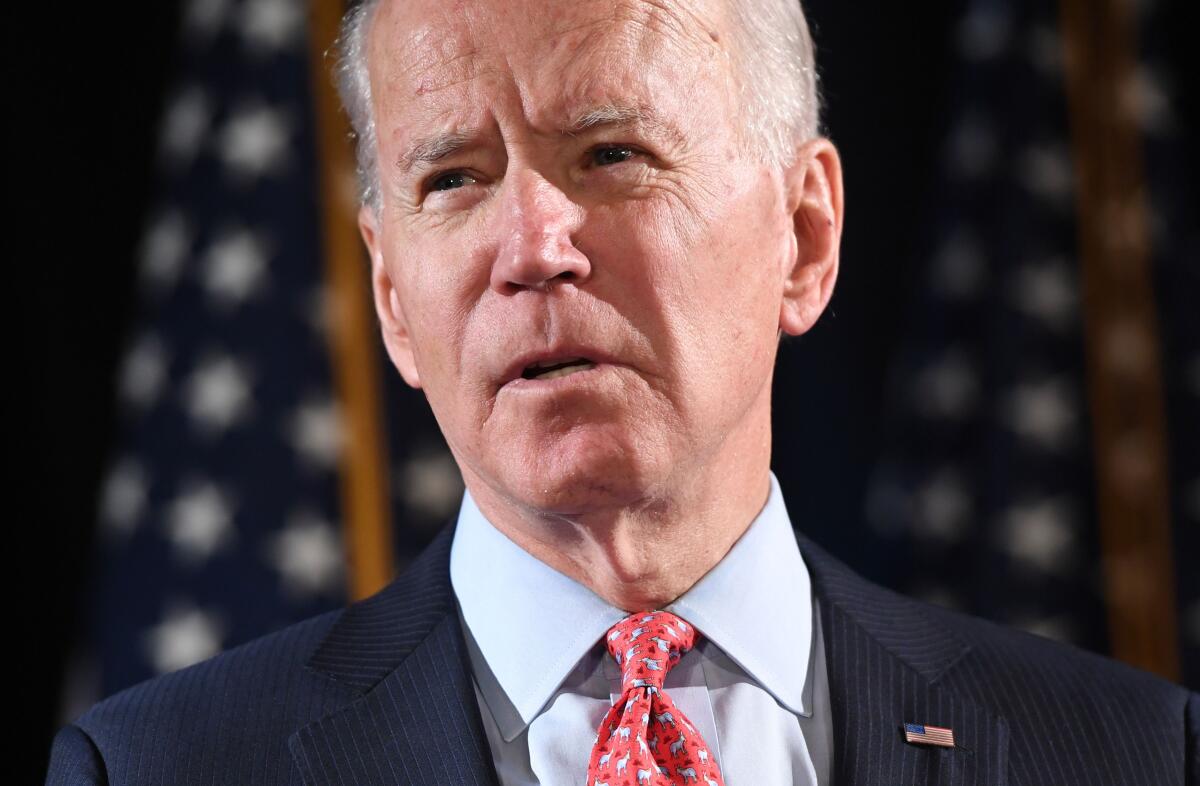
- Share via
WASHINGTON — Joe Biden on Thursday delivered the opening salvo in the general election campaign against President Trump in a speech that centered on the coronavirus crisis, but, more broadly, posed the question Democrats hope to make the centerpiece of their campaign: What kind of leader does America want?
With the primary competition against Sen. Bernie Sanders now largely behind him, the former vice president appeared in his hometown of Wilmington, Del., posed in front of five American flags, and focused on his general election rival, Trump.
“This virus laid bare the severe shortcomings of the current administration,” Biden said. “Public fears are being compounded by pervasive lack of trust in this president fueled by adversarial relationships with the truth.
“Our government’s ability to respond effectively has been undermined by the hollowing out of our agencies and disparagement of science.”
Later in the day, Sanders also gave a speech on the public health crisis that has overtaken the campaign, and he linked it to his signature issue: the need for a strong government role in providing healthcare to all who need it. Speaking from his hometown of Burlington, Vt., he argued that America’s ability to respond to the crisis has been hampered by the “incompetence and recklessness” of the Trump administration and by the absence of universal healthcare.
“If there ever was a time in the modern history of the country when we are all in this together, this is that moment,” Sanders said.
His wife, Jane, told reporters in Vermont that he would return to his work in the Senate after participating in a televised debate with Biden on Sunday, which has been moved from Phoenix to Washington, D.C., because of health concerns about air travel.
In a sign that Biden, meanwhile, is gearing up for the general election, he hired a new campaign manager, Jennifer O’Malley Dillon, a veteran Democratic campaign strategist who was a top campaign aide to President Obama and managed former Rep. Beto O’Rourke’s 2020 failed presidential bid.
In a campaign year that has careened around one hairpin turn after another, the coronavirus crisis has whipsawed the 2020 presidential contest in a way that, as attention turns to the general election, could work to Democrats’ advantage — at least for now.
The economic downturn and international turmoil inspired by the pandemic are posing challenges that Democrats believe will play to Biden’s strengths as he offers himself as the steady, seasoned candidate of experience. And it dovetails with his political strategy of portraying Trump as a feckless and ineffective leader.
Biden hit on themes that Democrats hope to make major elements of their campaign, lambasting the administration for failing to provide adequate testing for the virus and for hamstringing the country’s response by cutting health and research programs.
“By cutting our investment in global health, this administration has left us woefully unprepared for the exact crisis we now face,” Biden said. “When I’m president, we will be better prepared, respond better and recover better. We’ll lead with science. We’ll listen to the experts. We’ll heed their advice.”
“The markets will respond ... to strong, steady and capable leadership that addresses the root of the problem, not to efforts to cover it up,” he added.
The Trump campaign responded in a statement accusing Biden of politicizing the crisis.
“President Trump acted early and decisively and has put the United States on stronger footing than other nations,” the statement said. “His every move has been aimed at keeping Americans safe, while Joe Biden has sought to capitalize politically and stoke citizens’ fears.” The campaign put out a similar statement about Sanders.
At first, the impact of the coronavirus crisis on the 2020 campaign seemed mostly a matter of forcing Biden and Sanders — and even a reluctant president — to cancel big campaign rallies in keeping with advice of public health officials that Americans avoid large gatherings.
But as the ramifications of the pandemic have grown — its rapid spread across the globe, its unsettling effect on the U.S. and world economies, and the vast uncertainty about when and how it will be checked — it is clear that the political impact could be much more far-reaching.
Times of crisis often redound to the benefit of an incumbent president, who can demonstrate leadership and flex the muscles of government power to help citizens. This episode, however, is playing into Trump’s weakness.
President Trump’s halting efforts to respond to the coronavirus crisis have spotlighted long-standing problems in his White House -- lack of expertise, sloppy staff work, poor execution -- that undermine his effectiveness.
A leader more comfortable before a cheering crowd than behind the Resolute Desk in the Oval Office, Trump gave a speech about the pandemic Wednesday night that seemed stilted, sent the futures market plummeting, and had to be followed with multiple statements to clarify and correct the words televised to millions of prime-time viewers.
The collapse of the stock market and the threat of a recession would be dangerous to any incumbent, but pose a particular risk to Trump’s reelection because he has made the strength of the economy the cornerstone of his campaign pitch.
As with every episode in the drama of the Trump administration, no one knows how long this particular political dynamic will last. Many more crises and accomplishments will come and go over the nine months between now and election day.
The potential good news for Trump is that the economy could rebound as quickly as it has tanked if the public health crisis abates in time. But in the meantime, few things matter more than how Trump is perceived as handling the crisis.
“When a crisis or a disaster hits, political careers get made or broken by how the elected official responds,” said Whit Ayres, a Republican pollster. “It’s too early at this stage to be able to evaluate that.”
Other Republicans are already unnerved by Trump’s performance, including his Wednesday speech and his visit to the Centers for Disease Control and Prevention, where he wore a campaign hat.
One Trump political ally at work on his reelection expressed real pessimism about his reelection prospects, given his “disastrous” and “flippant” response to the public health emergency and the potential impact of an economic downturn on swing voters.
“It’s hard to get a fence-sitter to accept the chaos and character flaws without the benefit of a strong economy and labor market,” the person said, speaking on condition of anonymity to avoid retaliation.
The coronavirus outbreak has exploded just as Democrats were in the crucial stages of their nominating contest, which is now all but certain to be won by Biden. Sanders in a speech yesterday all but conceded defeat, but vowed to continue on for now, in order to press Biden on issues he cares most about.
Sanders’ ability to engineer a breakthrough now hinges entirely on the Sunday debate. The suspension of big rallies deprives Sanders of a marquee tool for energizing his followers. For Biden, the canceling of rallies is not such a blow, as he is strongest in smaller, one-on-one encounters.
The crisis atmosphere probably played some part in the wave of primary election victories that Biden has scored against Sanders over the last two weeks. Exit polls over five states that voted on Super Tuesday found that more than half of Democratic primary voters said that coronavirus was an important factor in their vote. Of those voters, 47% preferred Biden and 29% backed Sanders. Other exit polls show voters, by wide margins, preferred Biden over Sanders to handle a crisis.
Times staff writer Eli Stokols contributed to this report.
More to Read
Get the L.A. Times Politics newsletter
Deeply reported insights into legislation, politics and policy from Sacramento, Washington and beyond. In your inbox three times per week.
You may occasionally receive promotional content from the Los Angeles Times.
